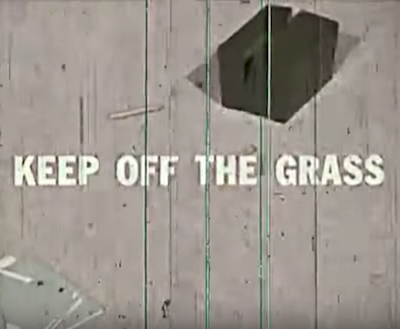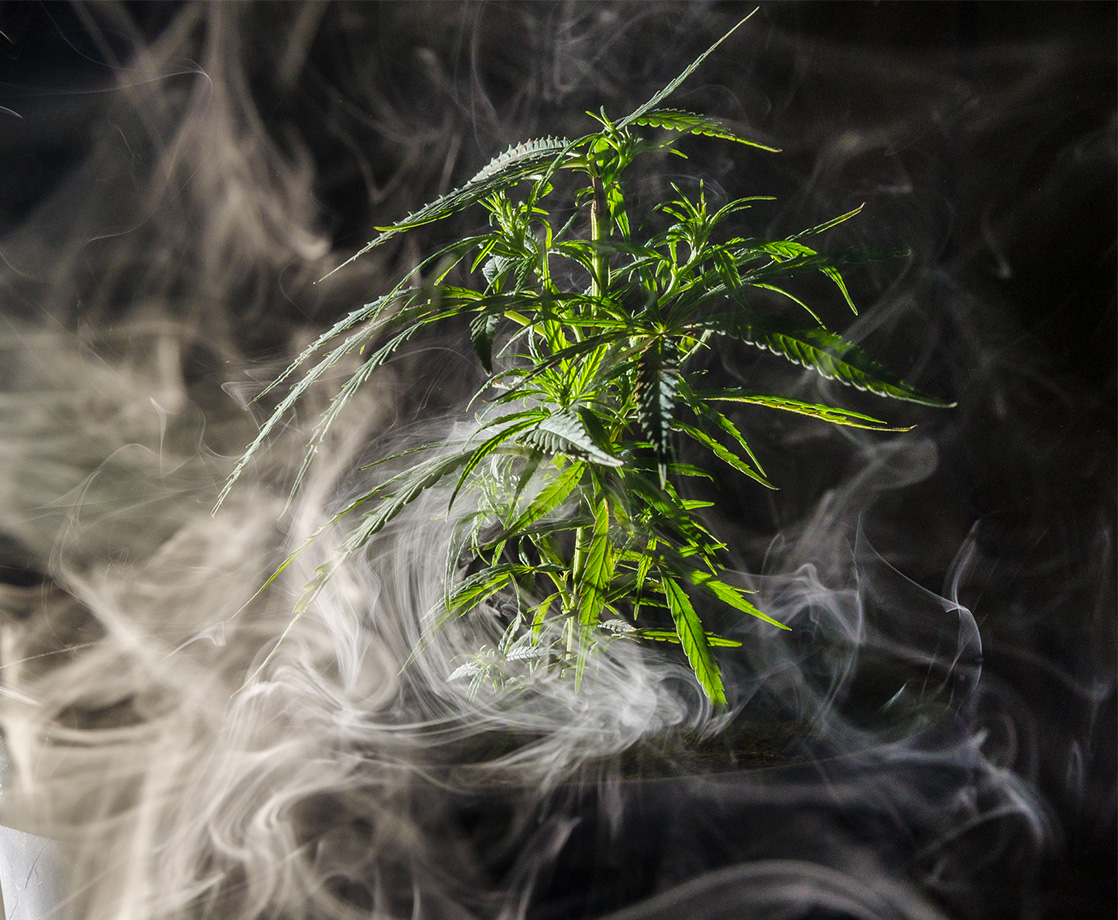Hypocrisy is the top target in Get Off the Grass, a film reporting from the front lines of the split between the great generation and the boomers. It's an anti-drug film about the naiveté with which the youth indulges in weed, and it counteracts its reasoning by all but ignoring any possible bad behavior of the prior generation. It's basically 20 minutes of "Parents Just Don't Understand," until the last two minutes when it's all like, "never mind parents totally do understand and they're right as hell literally all of the time." Released in 1970, this 22-minute slab of scare-mongering was directed by Ib Melchior, who, amazingly enough, IMDB credits with having written the cult classic b-movie Death Race 2000, which if you couldn't guess is a movie about an extremely dangerous car race that takes place in the future (aka the year 2000).
Anyways, back to Get Off the Grass, which opens with Tom's mom vacuuming the top of a microwave (B-plot: is she high too?) when she knocks over a box containing a collection of joints. It's unclear what made Tom think that the communal kitchen he shares with his parents was the ideal hiding spot, but maybe Tom was so high that he thought the smartest thing he could do was hide his weed in an intentionally dumb spot. I, for one, am never surer of the power of reverse psychology than when I'm three blunts deep on a Thursday evening.
Once it's uncovered, Tom is brought into his father's den, which is every white family's favorite place to talk about drugs, and the thing that makes propaganda films border on interior design porn. Until we see his father enter, it is initially completely unclear whether Tom is supposed to be somebody's son or husband (Tom, a teenager, absolutely looks like he's hovering at a sweet 39).
Before launching into a diatribe about the horrors of marijuana, Tom's dad makes a drink and lights a cigarette, for what initially seems to be dramatic effect. But quickly Tom calls his dad out for lecturing him on drug use when he's hardly clean himself. "Not the same," his father replies sternly. "Why not?" Tom retorts. "Easy for you to say that with a cigarette in one hand and a drink in the other." Take that, dad!

Soon, this becomes a fight rooted firmly in the generation gap. Tom argues that his dad's generation does stuff they know will kill them; Tom's father counters with how little they knew when they started doing the stuff, and how Tom's generation is in a similar spot with weed (which is the worst stuff). Back and forth they go until they reach a bet: Tom is to go and do some research on marijuana use, and if it yields no negative results, his dad will officially get off his back.
"The Bet" is a common trope in teen films, framing the narrative as both a game and a lesson in the making. In Get Off the Grass, the bet is really a means to get Tom out in the world and see his father's lessons about weed's effects in action. All of the warnings about "what weed does" come back as the film progresses, with Tom hearing them in his head, which is bizarre because they were literally uttered in the film's voice over. Then again, you've got to cut an awful lot of footage to squeeze everything into a 22-minute TV special, and sometimes you've got to sacrifice narrative continuity and/or coherence. Besides, I can only assume that Get off the Grass was a success, in that it existed and clearly didn't cost more than a few dimebags to make.
Tom heads out of the house and over to his friend Mac, who first introduced him to the Satan's foliage of damnation. He tells Mac about the bet, and while Mac thinks the whole thing is a little "square," he agrees to help him gather all the information he can on the drug. The two of them head over to a party of young college students smoking weed poolside. Looking around, Tom gawks at the crowd and remembers one of the side-effects of marijuana use (that he managed to hear, even though it was said in the film's voice over): "experiencing an uncontrollable feeling of hilarity."

Once Mac gets more stoned, he grabs Tom and takes him over to his friend Harry. On the drive over, Mac drives past a stop sign and through an intersection, which reminds him of another side-effect: irresponsibility and poor judgement. When they arrive at a head shop, complete with "Keep America Green" signage, Harry gives Tom a little TED Talk on how many famous artists, writers, musicians are all smoking dope, unlocking parts of their psyche that allows them to indulge their creativity in new and radical ways. They decide to head over to the home of one of the artists whose work is displayed in Harry's shop. On their way, the encounter wayward stoners asking for money, one of whom asks on behalf of her boyfriend, causing Tom to remember that weed causes loss of self-respect.
Mac's friend proves to be the film's most vicious judgement of the countercultural class. When he goes on a diatribe about the failures of the old-guard art world and the new kind of hippie radicalism that he was helping foster, the film's voice over gets into full-blown sarcastic teen mode. "It's great, man! Enhances the sense, opens your mind, stimulates real creativity," the voiceover says, lowkey mocking the idea that this was a generation of brilliant artists who all smoked weed. Before you have a chance to hold up half of all music made from 1964 to 1970 in protest, the cops are outside frisking Waco's younger brother against a police cruiser.

It's here the film uses this opportunity to not only highlight the criminality of weed use, but also the tenacity of the local police. As Tom looks on, the voice over makes a point of noting how impressed he was by the police's "calm efficiency, and the compassion they show…they never lose their cool, even as verbal abuse is hurled at the from the onlookers." This quick moment of institutionalized product placement is no real surprise. Get Off the Grass was produced with the help of the Santa Monica Police Department, which makes for an incredibly telling visual motif that proves true for most anti-drug films of the era, as Tom and every other character is, of course, white, and the praising of police patience is an experience marked hyper-specific at best.
This is true for much of the way drugs are portrayed in Get Off the Grass. There is a sense of patience that proves almost comical when considered from a different angle. The film almost frames drug use as a learning opportunity for some and a criminal act for others. The film approaches Tom and his father with a pathological sensitivity: "Two viewpoints, two opinions. But the relationship between Tom and his father is basically a good one." Every frame of the movie is spent attempting to justify something. Many adults drink excessively after a long day, but they do so once they've finished their work—something the film presents as an unequivocal truth. Weed smokers, meanwhile, apparently get high instead of doing whatever they were supposed to do. The drug kills ambition, stifles potential—it's not an access point to creativity.
Considering the film's 1970 release date, this is of course a baffling display of selective memory. Over the prior decade, weed had infiltrated mainstream society with the subtlety of a sledgehammer. Its proliferation wasn't contained to the youthquake of the mid-to-late-60s; music, art and film in the decade to follow were all radically transformed, and helped establish, perhaps for the first time, the ways in which art and culture could dictate social and political thought. The way in which Get Off the Grass attempts to destabilize the relationship between drugs and the era's art comes across as a desperate tactic. The film is about teaching someone a lesson, but it's also a weirdly reductive attempt at unlearning. It aims to report back evidence, but comes across howling on the other side of the generational chasm, an old voice screaming for the youth to pay attention, to get off the grass, to stay off his lawn.











